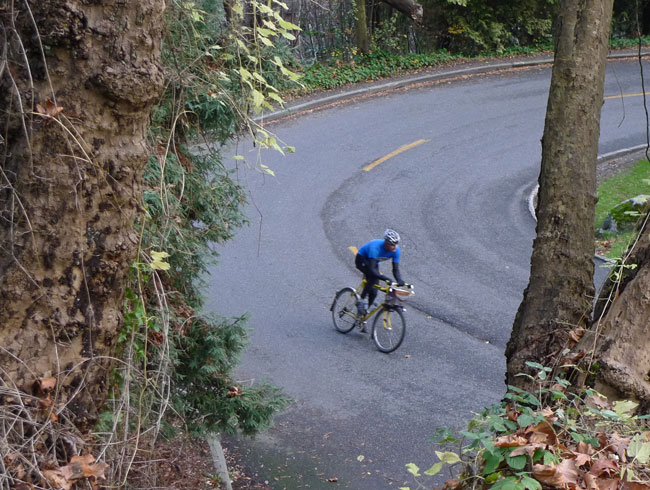A Typical Ride
When you read this blog or Bicycle Quarterly, you may get the impression that all our rides go over hundreds of miles and involve at least three mountain passes on gravel roads. The reality is more prosaic. We live in a major urban region, and we have busy lives. A typical ride doesn’t leave the urban area, and takes about 3 hours. For the most part, our rides are similar to those of the average ‘weekend warrior.’ The big rides are like eight-course dinners: rare, memorable events that have little in common with everyday life. Instead of telling you of yet another feast, here is a peek at our weekly fare. Let’s follow Ryan on one of our favorite rides, the ‘North End of Lake Washington.’ This is the course we often use to evaluate Bicycle Quarterly’s test bikes.
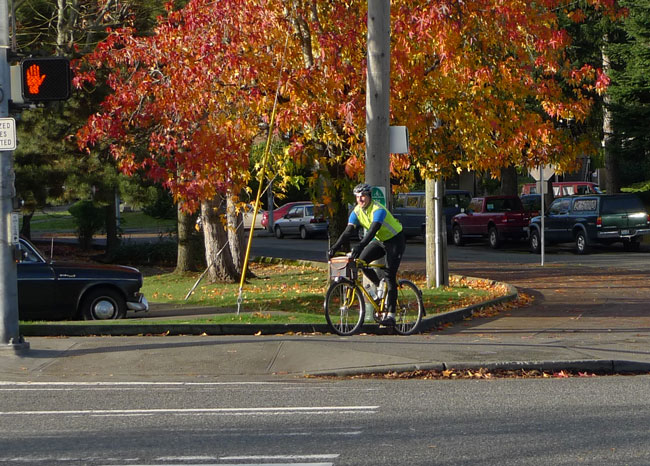
We usually meet where the Burke-Gilman Trail passes the University Village shopping mall. Most of our northerly routes out of Seattle converge here.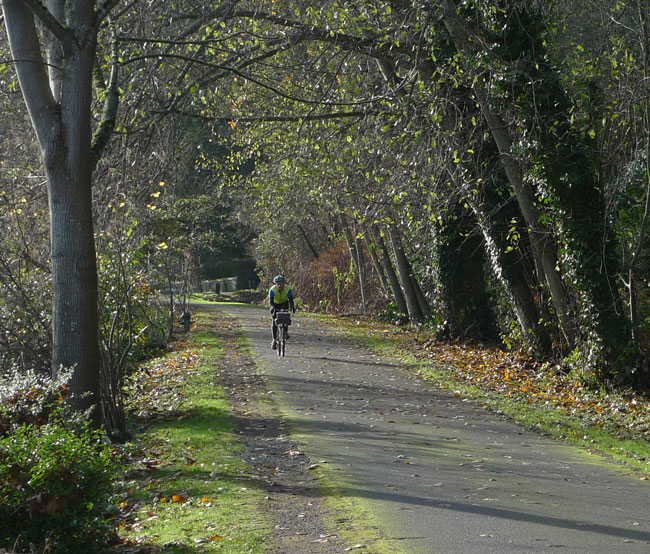
The Burke-Gilman Trail is a great way to get out of Seattle, and on this weekday, it’s almost deserted. Soon we reach Kenmore at the northern end of Lake Washington and leave the trail.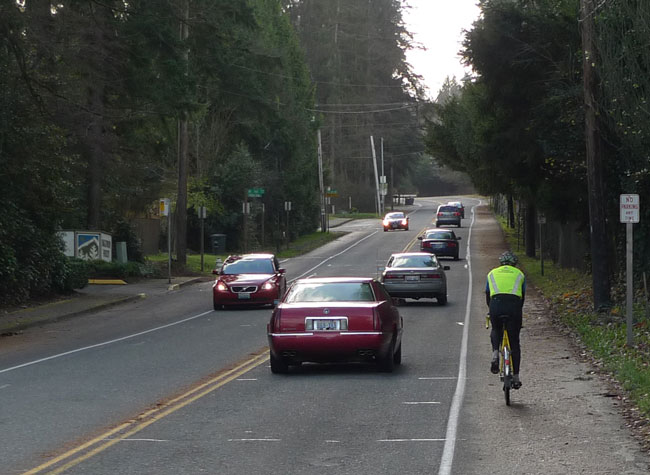
Juanita Boulevard is a long climb at a steady gradient. It does see some traffic, but the shoulder is wide and relatively clean. Just around the curve is the place that witnessed Mark’s conversion to the idea that ‘planing’ was real. That epiphany occurred when he dropped me on the first test bike we ever rode that was made from superlight tubing. Every time I pass that point, in my mind I hear his laugh as he disappeared up the road.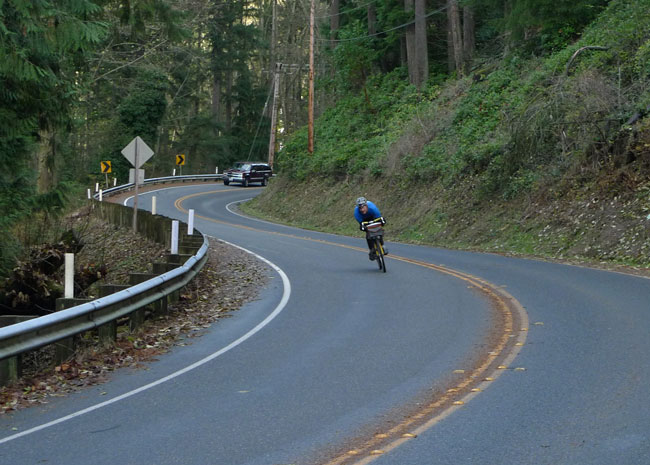
Juanita is a long climb, but the reward is the descent to Holmes Point. It’s a little-used road that winds its way down a ravine to a small lakeside community.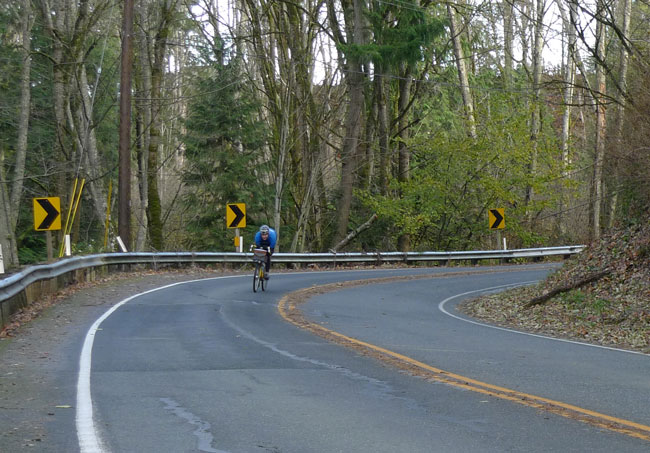
This corner does not look like much, but it has a wicked decreasing radius. More than one bike with less-than-optimal handling came close to the guardrail here. Ryan has enough confidence in the maneuverability of his l650B bike that he rounds the curve in the aero tuck. He wouldn’t do that when he rode his racing bike.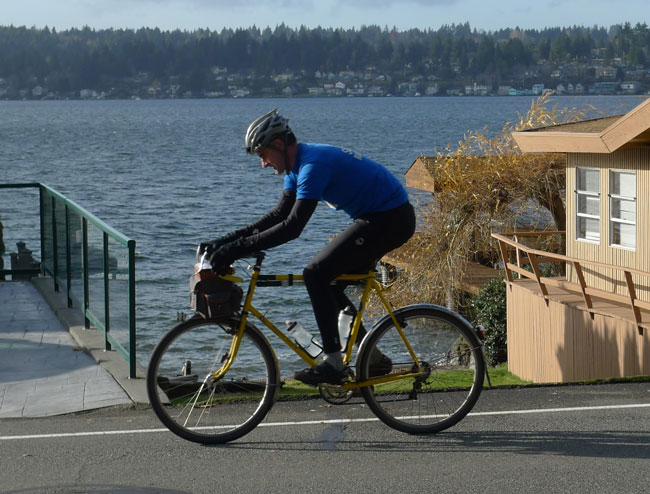
Holmes Point offers beautiful views of Lake Washington. The single, quiet street seems far away from the urban bustle, and it’s easy to see why houses cost so much here. We enjoy it briefly, but on a much smaller budget.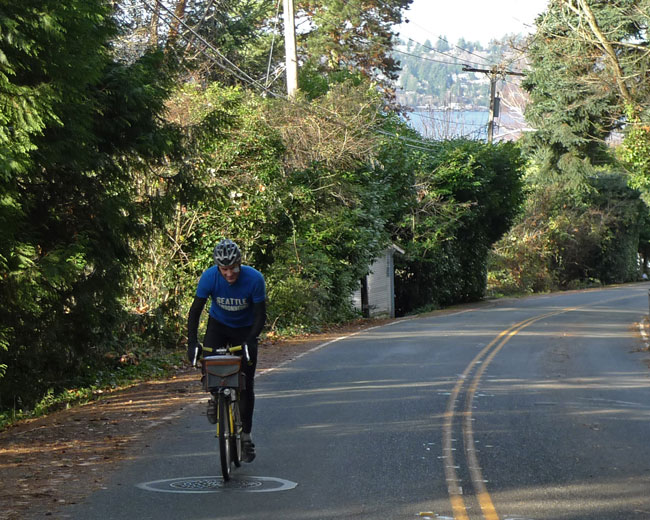
There is no downhill without an uphill, and this one is as nice as they come. It undulates and curves as it goes up another ravine. On a test ride, Mark and I would have switched bikes at the public beach. That would tell us one of us is just having a good day, or whether one bike really is faster than the other on the climbs.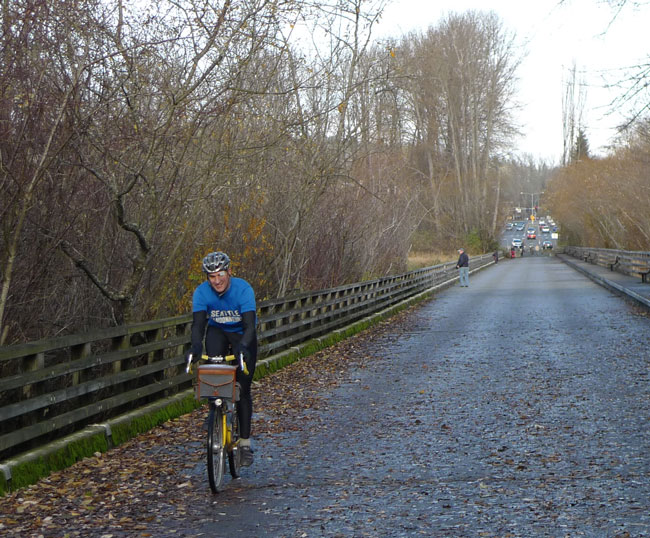
The long descent into Kirkland ends with a sprint. Then follows a relaxing little stretch across the water before heading into Kirkland proper.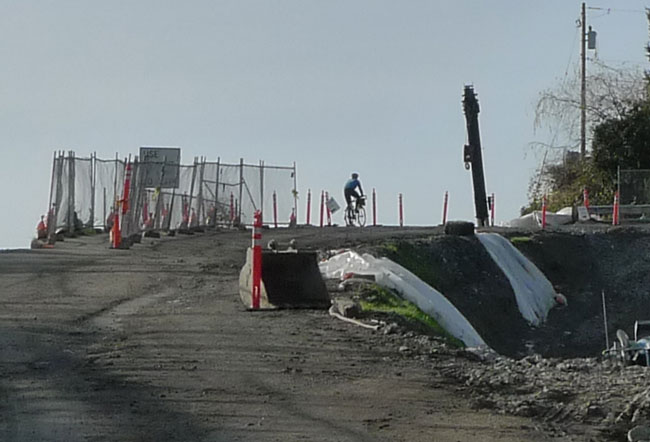
Leaving Kirkland, we go up the ‘hardest hill of Western Washington.’ It’s not very long, but plenty steep and comes almost without warning. For the past year, there has been construction for a new floating bridge across Lake Washington.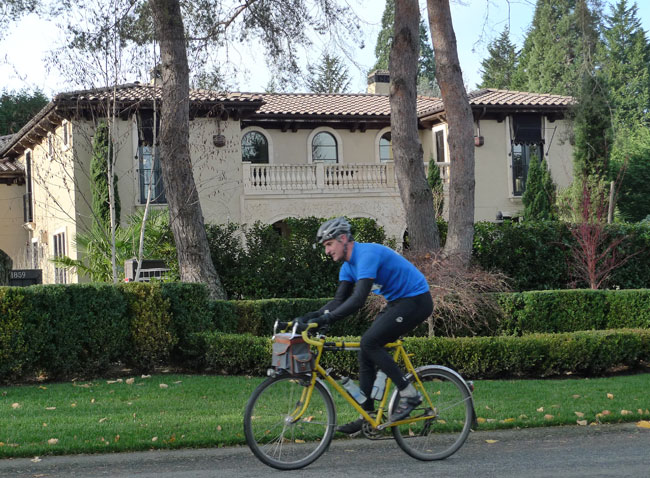
Medina is next. This is where the 1% live – Bill Gates’ house is somewhere around here. For us, this just means quiet streets with almost no traffic.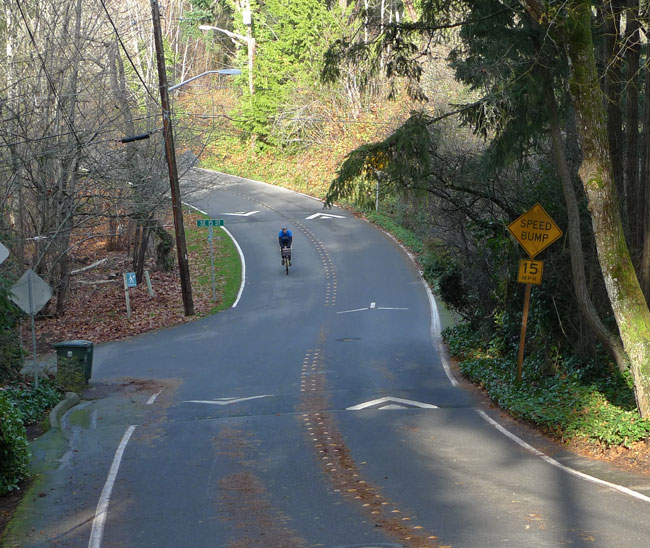
Instead of braving the traffic of downtown Bellevue, we take a little road along the shore of the lake. It adds a steep climb and a fast descent. Ryan is a bit faster than the sign on the right recommends, but he is ready to brake in case it should be necessary.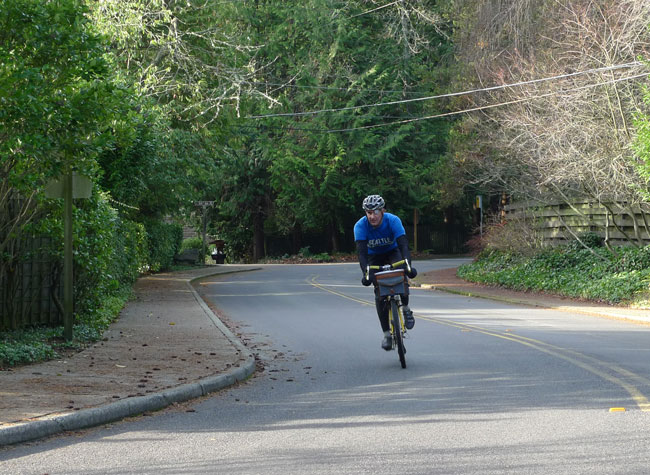
Beaux Arts was designed as an artists’ colony, during the early days of Seattle. Instead of logging the area, the houses were built among the trees. The streets curve organically, which makes for more interesting riding.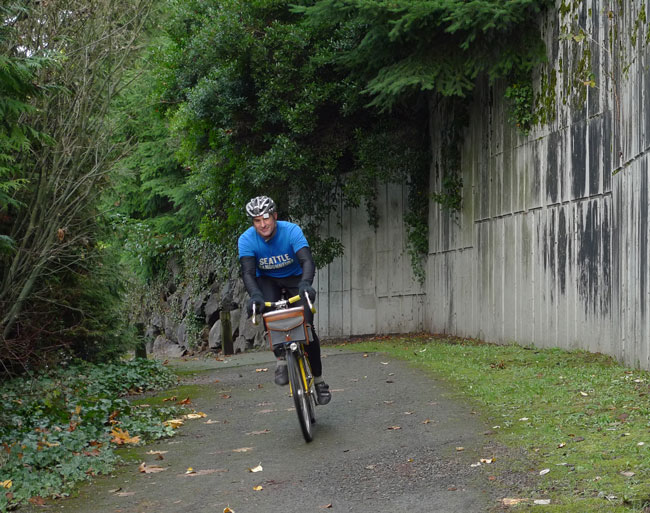
Instead of riding all the way around Lake Washington, we cross over to Mercer Island. Just before we join the bike path along the floating bridge, there is a little path that adds some (very smooth) gravel to this urban ride.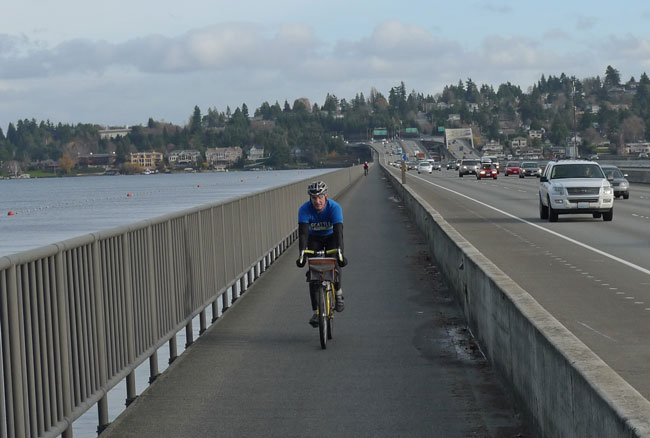
The bike path along the Interstate is not a favorite part of this ride. It is a bit noisy and completely straight, but it passes quickly.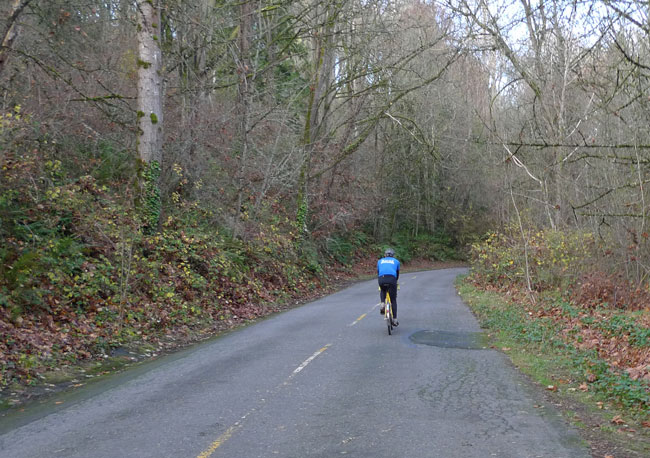
On the Seattle side, Ryan enjoys one of the many ‘pocket parks’ designed by the Olmstead Brothers. Seattle may not have a Central Park like New York City, but we do have little bits of Olmstead strung along the lake, in places where the terrain was too steep and too unstable to build houses. They are best experienced on a bike, where they provide vacations a few minutes at a time, making you feel like you are in the mountains far away from the city.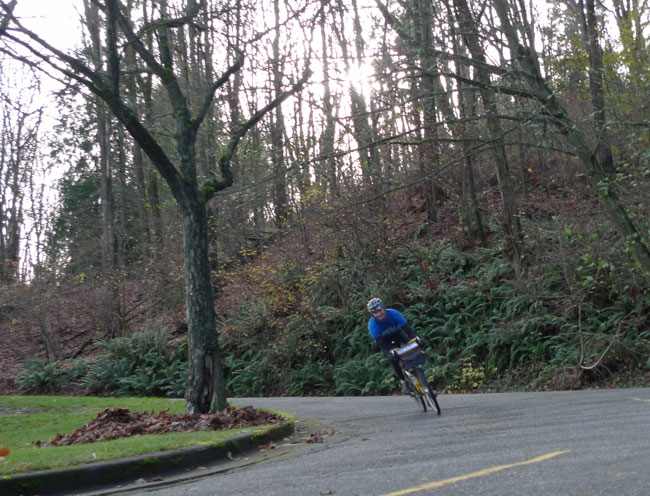
The bumpy pavement makes for tricky descents on bikes with narrow tires. That’s why we love wide tires even when our rides don’t stray from pavement.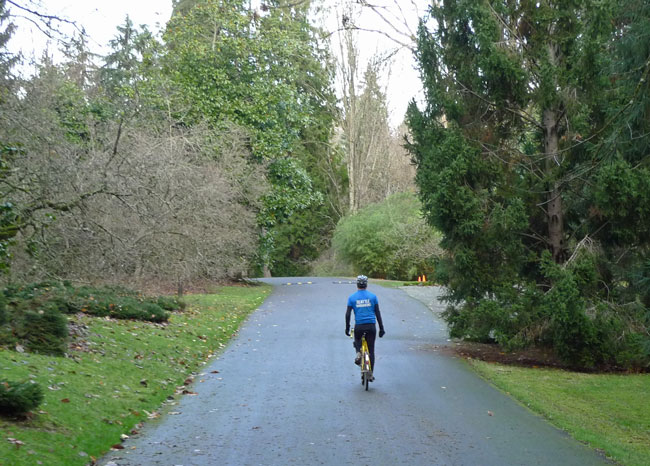
Another little stretch along the lake brings us to the Arboretum. This side road is closed to cars. A few more pedal strokes, and Ryan will be home. The total ride was about 70 km (45 miles). It takes a little under 3 hours on a good day.
That is a typical ride for us. Our 650B randonneur bikes excel at this type of riding: fast rides with friends on paved roads. They climb with the best, corner better than most, and are great fun to ride. It’s just an added bonus that we also can take them on the long adventures that we try to fit into our schedule at least a few times every year.
We really appreciate these short rides. On familiar roads, we notice changes in the season and the weather, and we can fine-tune our bike handling skills. For our bike tests, riding the same courses allows comparison with how other bikes felt on these particular stretches of road.
What amazes me time and again is how little “urban” these rides feel. Similar courses exist in most metropolitan areas. It takes some looking at maps, talking to other cyclists and exploring to find them, but it is worth the effort. Where do you like to ride?


